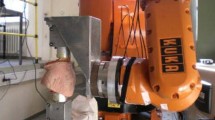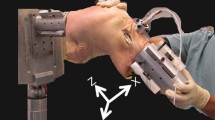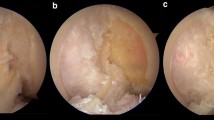Abstract
Purpose
To compare the time-zero stability of an anatomic anteromedial (AM) single-bundle ACL reconstruction to an anatomic central (CTR) single-bundle ACL reconstruction.
Methods
Twelve (6 paired) hip to knee cadaveric specimens were studied. Using custom ACL computer navigation software, a Lachman test and a previously validated, navigated mechanized pivot shift test were performed on 4 separate experimental groups in each specimen: (1) intact ACL, (2) ACL deficient with total medial and lateral meniscectomy, (3) following anatomic AM single-bundle ACL reconstruction, and (4) after anatomic CTR single-bundle ACL reconstruction. Maximum anterior tibial translation in each group was measured.
Results
Lachman: No significant difference was observed between the AM and CTR reconstructions (n.s.) or between reconstruction and the intact ACL (3.4 ± 1.7 mm) (n.s.). Pivot Shift: Both the AM and CTR ACL reconstructions significantly reduced anterior translation relative to the ACL/menisci-deficient condition (lateral compartment: 8.9 ± 3.8 mm and 6.75 ± 4.6 mm vs. 17.25 ± 3.5 mm, respectively; P < 0.001 and medial compartment: −3.0 ± 5.3 mm vs. −3.7 ± 5.7 mm vs. 6.2 ± 6.7 mm, P < 0.05). There was also a significant difference between the AM (P < 0.001) and CTR (P < 0.05) ACL reconstructions and the intact ACL (2.8 ± 4.4 mm) for lateral compartment translation. Further, no difference was found between lateral or medial compartment translations in the AM versus CTR reconstructions (n.s.).
Conclusions
It has been shown that there was no difference in the time-zero biomechanical stability between an anatomic anteromedial and anatomic central single-bundle ACL reconstruction. Given the current debate on the best anatomic ACL reconstruction technique, anatomic socket position in either the anteromedial or central locations provides similar time-zero biomechanics.



Similar content being viewed by others
References
Bedi A, Musahl V, Lane C, Citak M, Warren RF, Pearle AD (2010) Lateral compartment translation predicts the grade of pivot shift: a cadaveric and clinical analysis. Knee Surg Sports Traumatol 18:1269–1276
Brophy RH, Pearle AD (2009) Single-bundle anterior cruciate ligament reconstruction: a comparison of conventional, central, and horizontal single-bundle virtual graft positions. Am J Sports Med 37:1317–1323
Brophy RH, Voos JE, Shannon FJ et al (2008) Changes in the length of virtual anterior cruciate ligament fibers during stability testing: a comparison of single-bundle reconstruction and native anterior cruciate ligament. Am J Sports Med 36:2196–2203
Cohen SB, VanBeek C, Starman JS, Armfield D, Irrgang JJ, Fu FH (2009) MRI measurement of the 2 bundles of the normal anterior cruciate ligament. Orthopedics 32:687
Donaldson WF III, Warren RF, Wickiewicz T (1985) A comparison of acute anterior cruciate ligament examinations. Initial versus examination under anesthesia. Am J Sports Med 13:5–10
Ferretti A, Monaco E, Labianca L, De Carli A, Maestri B, Conteduca F (2009) Double-bundle anterior cruciate ligament reconstruction: a comprehensive kinematic study using navigation. Am J Sports Med 37:1548–1553
Harner CD, Baek GH, Vogrin TM, Carlin GJ, Kashiwaguchi S, Woo SL (1999) Quantitative analysis of human cruciate ligament insertions. Arthroscopy 15:741–749
Howell SM (1998) Principles for placing the tibial tunnel and avoiding roof impingement during reconstruction of a torn anterior cruciate ligament. Knee Surg Sports Traumatol Arthrosc 6(suppl 1):S49–S55
Howell SM, Clark JA (1992) Tibial tunnel placement in anterior cruciate ligament reconstructions and graft impingement. Clin Orthop Relat Res 283:187–195
Iriuchishima T, Tajima G, Ingham SJ, Shen W, Smolinski P, Fu FH (2010) Impingement pressure in the anatomical and nonanatomical anterior cruciate ligament reconstruction: a cadaver study. Am J Sports Med 38:1611–1617
Kato Y, Ingham SJ, Kramer S, Smolinski P, Saito A, Fu FH (2010) Effect of tunnel position for anatomic single-bundle ACL reconstruction on knee biomechanics in a porcine model. Knee Surg Sports Traumatol Arthrosc 18:2–10
Kocher MS, Steadman JR, Briggs KK, Sterett WI, Hawkins RJ (2004) Relationships between objective assessment of ligament stability and subjective assessment of symptoms and function after anterior cruciate ligament reconstruction. Am J Sports Med 32:629–634
Koh J (2005) Computer-assisted navigation and anterior cruciate ligament reconstruction: accuracy and outcomes. Orthopedics 28:s1283–s1287
Kopf S, Musahl V, Tashman S, Szczodry M, Shen W, Fu FH (2009) A systematic review of the femoral origin and tibial insertion morphology of the ACL. Knee Surg Sports Traumatol Arthrosc 17:213–219
Lucie RS, Wiedel JD, Messner DG (1984) The acute pivot shift: clinical correlation. Am J Sports Med 12:189–191
Maak TG, Bedi A, Raphael BS, Citak M, Suero E, Wickiewicz T, Pearle AD (2011) Effect of femoral socket position on graft impingement after anterior cruciate ligament reconstruction. Am J Sports Med 39:1018–1023
Matsumoto H (1990) Mechanism of the pivot shift. J Bone Jt Surg Br 72-B(5):816–821
Miller MD, Gerdeman AC, Miller CD, Hart JM, Gaskin CM, Golish SR, Clancy WG Jr (2010) The effects of extra-articular starting point and tarsotibial femoral drilling on the intra-articular aperture of the tibial tunnel in ACL reconstruction. Am J Sports Med 38:707–712
Musahl V, Jordan SS, Colvin AC, Tranovich MJ, Irrgang JJ, Harner CD (2010) Practice patterns for combined anterior cruciate ligament and meniscal surgery in the United States. Am J Sports Med 38:918–923
Musahl V, Voos J, O’Loughlin PF, Stueber V, Kendoff D, Pearle AD (2010) Mechanized pivot shift test achieves greater accuracy than manual pivot shift test. Knee Surg Sports Traumatol Arthrosc 18:1232–1238
Pearle AD, Shannon FJ, Granchi C, Wickiewicz TL, Warren RF (2008) Comparison of 3-dimensional obliquity and anisometric characteristics of anterior cruciate ligament graft positions using surgical navigation. Am J Sports Med 36:1534–1541
Robinson J, Stanford FC, Kendoff D, Stüber V, Pearle AD (2009) Replication of the range of native anterior cruciate ligament fiber length change behavior achieved by different grafts: measurement using computer-assisted navigation. Am J Sports Med 37:1406–1411
Sapega AA, Moyer RA, Schneck C, Komalahiranya N (1990) Testing for isometry during reconstruction of the anterior cruciate ligament. Anatomical and biomechanical considerations. J Bone Jt Surg Am 72:259–267
van Eck CF, Lesniak BP, Schreiber VM, Fu FH (2010) Anatomic single- and double-bundle anterior cruciate ligament reconstruction flowchart. Arthroscopy 26:258–268
Voos JE, Musahl V, Maak TG, Wickiewicz TL, Pearle AD (2010) Comparison of tunnel positions in single-bundle anterior cruciate ligament reconstructions using computer navigation. Knee Surg Sports Traumatol Arthrosc 18:1282–1289
Zantop T, Diermann N, Schumacher T, Schanz S, Fu FH, Petersen W (2008) Anatomical and nonanatomical double-bundle anterior cruciate ligament reconstruction: importance of femoral tunnel location on knee kinematics. Am J Sports Med 36:678–685
Zantop T, Petersen W, Sekiya JK, Musahl V, Fu FH (2006) Anterior cruciate ligament anatomy and function relating to anatomical reconstruction. Knee Surg Sports Traumatol Arthrosc 14:982–992
Acknowledgments
Specimens were provided by Praxim, Inc. The study was partially funded by the Eduardo Salvati Resident Research Grant.
Author information
Authors and Affiliations
Corresponding author
Rights and permissions
About this article
Cite this article
Cross, M.B., Musahl, V., Bedi, A. et al. Anteromedial versus central single-bundle graft position: which anatomic graft position to choose?. Knee Surg Sports Traumatol Arthrosc 20, 1276–1281 (2012). https://doi.org/10.1007/s00167-011-1737-0
Received:
Accepted:
Published:
Issue Date:
DOI: https://doi.org/10.1007/s00167-011-1737-0




